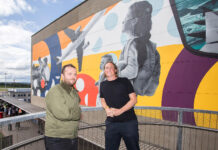I was honoured last year to be asked by the Dublin Rape Crisis Centre to write something for their 16 Days of Activism campaign. Given all that’s happened in recent days, I thought this mightn’t be a bad time to publish a modified version of that piece here.
It’s overwhelming, isn’t it?
It feels at the moment like every day – sometimes more than once a day – the same story breaks, over and over. All that’s ever different is the details, and the details are never all that different. It’s a story old as time: powerful men harassing, bullying and – sometimes – sexually abusing. What’s changed, though, is that those they abused are speaking out now.
The #MeToo movement, Harvey Weinstein, the Trump presidency and more, they are all of a theme. They’ve all contributed to a tipping point, a critical mass. In the wake of last week’s acquittal of all of those charged in the Belfast trial, there have been rallies throughout the country – Belfast, Dublin, Cork and Galway – as those who identified with the plaintiff turned out to offer her their support, and to show solidarity with survivors of sexual abuse.
Survivors are standing up, and standing together. What’s important now is that we stand with them. What’s also important is that other survivors – who may be living with trauma that is years or decades old – realise that, first and foremost, help is just a call away.
Ireland is a country with an appalling history of sexual abuse, but we still routinely see judges handing down dispiritingly-short sentences to sex offenders, and it’s depressingly obvious some in the media still haven’t grasped the seriousness of sexual crime. The Sexual Abuse and Violence in Ireland Report (SAVI) is 15 years old, but it says – among other things – 27% of Irish women and men experience sexual violence in their childhood. One third of Irish women and men will experience sexual violence in their lifetime. One in five women and one in 10 men experience sexual assaults as adults and 42% of women experience some form of sexual abuse.
Those figures are shocking, but they date from an age before social media, before a time when pre-teens could access instantly hard-core pornography, before a time when abuse survivors were empowered by others coming forward. We need – as a matter of considerable urgency – an up-to-date picture of sexual violence in Ireland.
We need to introduce mandatory one-on-one treatment for convicted sex offenders and we need urgently to reverse spending cuts to therapy for abuse survivors.
We need consent classes in primary schools because we need to build up in children the notion that they own their own minds and bodies. We need to have an honest conversation too about pornography. Kids can access absolutely anything at the click of a mouse, and are developing unrealistic and often unhealthy attitudes and expectations. Allowing children to only learn about sex through watching online pornography is a recipe for horrors.
We need to give our children proper RSE (relationships and sexuality education) and we need to make very clear that we don’t allow religious organisations to influence any other aspects of the curriculum and we won’t allow them to influence RSE either. The announcement this week by Education Minister Richard Bruton of a major review of the curriculum for sex education is to be welcomed. It will be interesting to see who comes out against that review.
We also need to have a national conversation about toxic masculinity. That’s a concept used in psychology and gender studies to examine Western norms of masculine behaviour, where men are expected to be aggressive, dominant and self-reliant. These inherited, societal attitudes have – of course – the unintended but entirely predictable consequences of men struggling with violence, and sexual violence, and attitudes of homophobia and misogyny. We are already only too aware in this country of what happens when society tells young men to tamp down their emotions, to always be strong, and to never show vulnerability. We know all too well about the epidemic of depression and suicide through which our young men are struggling to negotiate.
It’s called “toxic masculinity” not as a way of attacking men, but because of the negative effects – upon society and upon men – of men being expected to conform to such stereotypes. Basically, we urge young boys to be hard men and then we’re horrified with the consequences of their growing up to be hard men, or growing up to feel inadequate when they are not hard men.
We need to build up in boys and young men the desire to be good and decent men who not only respect girls and women, but who also want to support girls and women as allies and equals. We need to instil in society the notion that being a “nice guy” is not a weakness, but rather the best goal for any young man. Kindness and decency should be the very least to which any child would aspire.
If you are a survivor of abuse, you’re not alone. The Dublin Rape Crisis Centre’s 24 hour national helpline is 1800 778888. They offer superb advice and expert assistance to anyone in need. They listen with compassion and kindness and without judgement. Beyond that, your priority has to be your own wellbeing. Whatever you do, don’t feel under pressure. Surround yourself with kind people. The last thing you need is “tough love” or victim-blaming. Please, above all else, remember you did no wrong. Be kind to yourself.
It’s overwhelming, yes, but we are at a tipping point. We need now a root-and-branch approach to sexual crime. We need to educate our Judiciary on sentencing. We need to educate our children on consent. That our Government has agreed to fund SAVI II is a very welcome development.
And please, never forget: you’re not alone.
The Dublin Rape Crisis Centre’s 24 hour national helpline is 1800 778888








